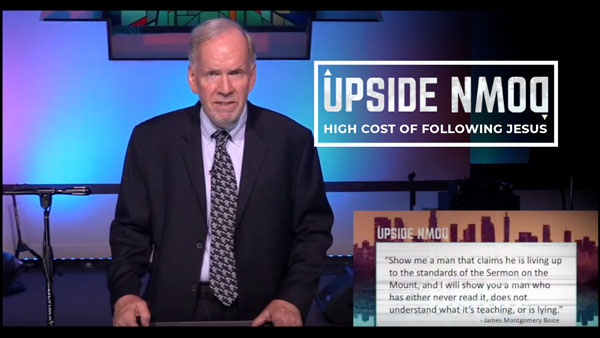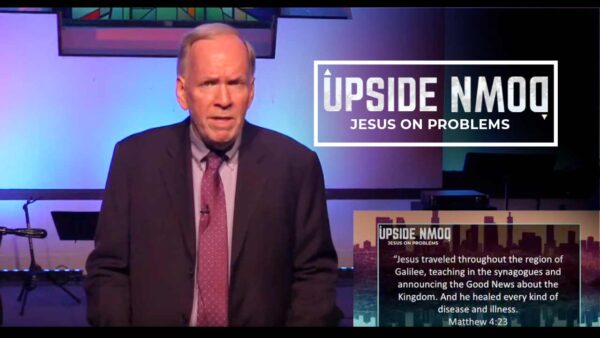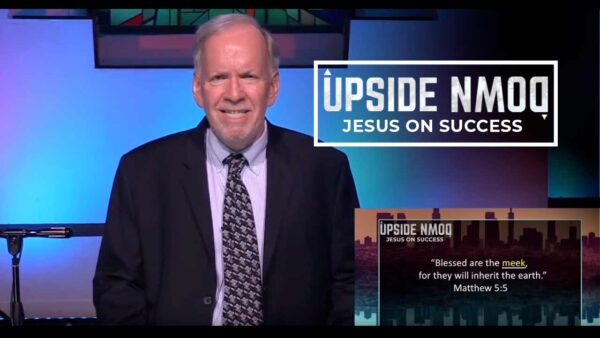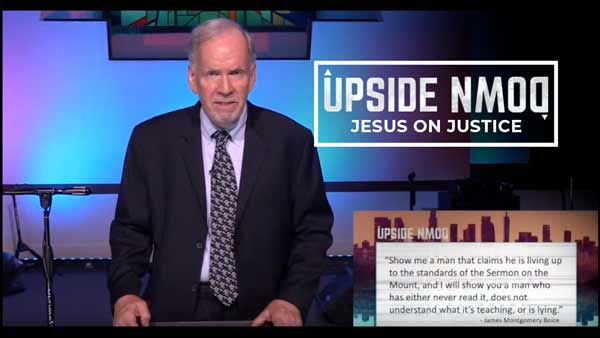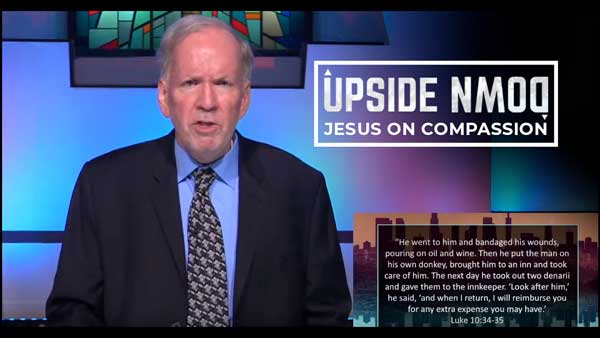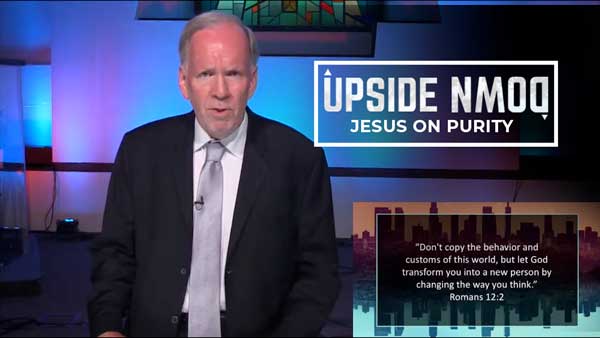Dr. Rick Mandl - June 21, 2020
The High Cost of Following Jesus
Sermon Manuscript: Upside Down Message 1- Blessed Are The Poor In Spirit
Sermon preached by Dr. Rick Mandl, Eagle Rock Baptist Church, June 20 & 21, 2020 Recorded in Los Angeles, CA.
Hey church family. This weekend we’re beginning a new teaching series called “Upside Down.” And in preparing for this series, I spent some time pondering and I was thinking that... People listened to him for his wisdom. Yet he said some things that seemed paradoxical. He would challenge you with his words; He would cause you to mull them over in order to make sense of them, His way of thinking was not an ordinary way of thinking. He hasn’t been with us, walking the earth, sharing in our mortality, for awhile now, yet somehow people still remember the things he said. The one I’m talking about of course, is Yogi Berra.
Yogi would amaze people by saying things like: "I usually take a two-hour nap from one to four." Things like, "Always go to other people’s funerals otherwise, they won’t come to yours." Things like, "Never answer an anonymous letter." Things like, "Ninety percent of this game, is half mental." And then there were other things he said, that were kind of beyond our understanding. He was once asked what he thought about a popular restaurant, and he said, "Nobody goes there anymore. It’s too crowded." He also said, “If you can’t imitate him, don’t copy him.” He said, “You can observe a lot by just watching.” And I’m sure I could go on and on, quoting yogisms to you, but that doesn’t seem profitable, because as Yogi once said, “I really didn’t say everything I said.”
There was another man who people loved to listen to for wisdom. He also said things that seemed puzzling to those who heard him. The difference is the words of Jesus not only mystified people. They changed the lives of those who took them to heart. And it’s his words that we’re going to be looking at over the coming weeks as we look at beginning section of his S.O.M. and look at the beatitudes.
Today looking at the first on the list of eight, and also looking at THE HIGH COST OF FOLLOWING JESUS. Maybe you’ve never thought about the fact that there’s a cost to following Jesus. And yet he himself said, “If anyone would come after me, (here is what is what it will cost) he must deny himself and take up his cross daily and follow me” (Luke 9:23). Today in the 21st century when we sometimes invite people to follow Jesus and we tone down that message. We say, “You’ve got a pretty good life right now. Why not make it better by adding Jesus to what you’ve already got going on?” Even though salvation is free, in the sense that Jesus paid it all so that you don’t have to do anything to earn what he accomplished for us at the cross. The reality remains that there is ... a cost to following Jesus.
And again, today a lot of people are confused by what it means to “FOLLOW” him. (TWITTER PICTURE) Yet what it means to “Follow” Jesus is what we’re going to be talking about in this series. On your message notes, at the top you’ll see the two verses that begin Matthew chapter 5. They tell us that, “Now when he saw the crowds, he went up on a mountainside and sat down. His disciples came to him, and he began to teach them, saying...” (Matthew 5:1-2). What follows are 8 statements we refer to as the Beatitudes. These are going to be our focus for the coming weeks. Each of the 8 statements begins with the same two words... “Blessed are.” These are God’s roadmap for the blessed life. Let’s begin by reading them.
“Blessed are the poor in spirit, for theirs is the kingdom of heaven. Blessed are those who mourn, for they will be comforted. Blessed are the meek, for they will inherit the earth” (Mt. 5:3-6).
“Blessed are those who hunger and thirst for righteousness, for they will be filled. Blessed are the merciful, for they will be shown mercy” (Matthew 5:6-7).
“Blessed are the pure in heart, for they will see God. Blessed are the peacemakers, for they will be called sons of God” (Matthew 5:8-9).
“Blessed are those who are persecuted because of righteousness, for theirs is the kingdom of heaven. “Blessed are you when people insult you, persecute you and falsely say all kinds of evil against you because of me” (Matthew 5:10-11).
“Rejoice and be glad, because great is your reward in heaven, for in the same way they persecuted the prophets who were before you” (Matthew 5:12).
You read these verses and you realize that God wants to bless your life. But the question for you and me is “Am I living the kind of life that God can bless?” Today we’re looking at the first of the eight statements, it’s our memory verse found in Matthew 5:3. “Blessed are the poor in spirit, for theirs is the kingdom of heaven. ” Matthew 5:3
WHEN YOU THINK OF A PERSON WHO IS “BLESSED”, WHAT DO YOU THINK OF? If you’re like most people you probably think about those people in his world that we would consider “fortunate” or “happy” - - because that is what the word blessed means - - fortunate or happy. HAPPINESS is something that is very important to most people. In fact so important that the authors of our own country’s Declaration of Independence wrote that its pursuit was one of three God-given rights. We hold these truths to be self-evident, that all men are created equal, that they are endowed by their Creator with certain unalienable Rights, that among these are Life, Liberty, and the pursuit of Happiness. Those words as I said come from the Declaration of Independence - - but there is a PROBLEM with them. And the problem is that you won’t find anywhere in the Bible that God has granted us the unalienable right to pursue happiness. God’s primary interest is in our HOLINESS, not our HAPPINESS.
Happiness or BLESSEDNESS is something that he tells us can be ours as we’ll see today and in the weeks to come -- but it’s not something that we are told to pursue as an end in itself - as an inalienable right but rather we’re told that it comes as a by-product of being the kind of people that God intends for us to be. But having said that think for a moment about the question... “What would it take to make you happy? I think it’s a fair question because a report came out this week showing the results of a poll conducted last month that found that folks in the U.S. are more unhappy today than they've been in nearly 50 years. So, if it’s true that misery loves company, and you’re miserable, just know that you’ve got a lot of company. Another survey asked 52,000 AMERICANS the question that I just asked you, “What would it take to make you happy? And here are their top answers in the order listed...
At the top of the list...
- Friends or Social Life
- Job
- Being in Love
- Recognition & Success
- Sex
- Personal Growth
- Good Financial Situation
- Having a House or Apartment
- Being attractive & beautiful
- Health & Physical Condition
- The City I live in
- My Religion
- Recreation and Exercise
- Being A Parent
- Marriage
- And last – My Partner's Happiness ---
Now maybe you could add an answer or two of your own but as you sort through that list what you'll find that AS DIFFERENT AS THOSE ANSWERS MAY BE, they ALL HAVE SOMETHING IN COMMON and that is that they all focus on something EXTERNAL instead of INTERNAL. The popular idea of happiness is having the right CIRCUMSTANCES. It's what you might call "WHEN AND THEN" thinking... When I GET OUT OF SCHOOL then I'll be happy. When I GET A JOB... When I GET MARRIED... When I HAVE CHILDREN or When THE KIDS LEAVE HOME... According to conventional wisdom if you’re not happy what you need to do is change your circumstances - - then you’ll be happy.
God says that what you need to do is change your heart. He says that happiness comes from the inside out... “God’s path to happiness is having the right HEART" I think that those who were listening as our Lord preached this Sermon on the Mount were surprised when he began by saying... “Blessed are the poor in spirit.” You would think that if you are going to talk about the “fortunate” people which is sort of what this word “Blessed” means... it doesn’t seem likely that it would be followed by “Poor in Spirit.” You would expect to hear him say, "HOW BLESSED ARE THE RICH... HOW FORTUNATE ARE THE TALENTED... HOW GLAD THOSE PEOPLE WHO ARE POWERFUL -- OUGHT TO BE... BLESSED ARE THE CHARISMATIC - THOSE PEOPLE WHO HAVE THE TYPES OF PERSONALITIES WHO ATTRACT AND CAN PROVIDE LEADERSHIP..." Yet Jesus starts his message by saying, "BLESSED ARE THOSE PEOPLE WHO ARE SPIRITUALLY IMPOVERISHED." And then he goes on and says, "BLESSED AS WELL ARE THOSE PEOPLE WHO MOURN." He says, "HOW FORTUNATE IT IS, WHEN MEN PERSECUTE YOU FOR THE CAUSE OF CHRIST." I’m sure it didn’t take his hearers very long to realize that Jesus had SWITCHED THE PRICE TAGS. He was turning conventional wisdom on its ear and introducing them to something that was altogether new. Something that was upside down.
In this Sermon on the Mount our Lord was ... demonstrating the KIND of RIGHTEOUSNESS that is necessary to enter God’s kingdom. As you study this Sermon if you were to try and identify a key verse that points to its theme I would suggest that verse would be Matthew 5:20 which says, “For I tell you that unless your righteousness surpasses that of the Pharisees and the teachers of the law, you will certainly not enter the kingdom of heaven” (Matthew 5:20). What does it mean to be “POOR IN SPIRIT”?
It begins with an awareness of your own SPIRITUAL BANKRUPTCY. And that awareness doesn’t occur when you compare yourself to the people around you. I mean let’s be honest... sometimes when we compare ourselves to the people around us, we can come out feeling pretty good about ourselves. But... When you see yourself in comparison to GOD’S HOLINESS it’s an altogether different result. Jesus illustrated this through a Parable. Luke 18:9-14, The Parable of the Pharisee and the Tax Collector. There we read these words...
“To some who were confident of their own righteousness and looked down on everybody else, Jesus told this parable: “Two men went up to the temple to pray, one a Pharisee and the other a tax collector” (Luke 18:9-10). “The Pharisee stood up and prayed about himself: ‘God, I thank you that I am not like other men - robbers, evildoers, adulterers - or even like this tax collector. I fast twice a week and give a tenth of all I get” (Luke 18:11-12).“But the tax collector stood at a distance. He would not even look up to heaven, but beat his breast and said, 'God, have mercy on me, a sinner” (Luke 18:13). Jesus concluded the parable by telling us, “I tell you that this man, rather than the other, went home justified before God" (Luke 18:14). That's another way of saying that he was blessed because he was poor in spirit.
So, let me ask you... Which attitude do you have? Is your attitude more like that of the Pharisee or is it more like that of the Tax Collector? We’d all like to answer, “Of course the Tax Collector.” But let’s be honest. Isn’t there maybe just a little bit of the Pharisee in all of us. We can feel like, even though we’re not perfect, at least we’re a little bit better than that guy over there... And realizing that... we feel like God is pretty fortunate to have us on his team. Jesus warns us against that attitude. He says, “It is not the healthy who need a doctor, but the sick. I have not come to call the righteous, but sinners" (Mark 2:17). In other words - the only people who will ever come to get what Jesus has to give are very sick people, people who know that they are spiritually, morally - crippled, powerless, bankrupt, unclean, and unworthy.
How do you come to that point? How do you become one of those people that Jesus calls blessed? It happens through practicing what you might call “First Place Living.” A key verse in this Sermon on the Mount is Matthew 6:33. It says, “Your heavenly Father already knows perfectly well what you need and he will give it to you." We read the verse and we like to stop there... “Your heavenly Father already knows perfectly well what you need and he will give it to you." But it goes on and it says... "if you give him first place in your life and live as he wants you to" (Matthew 6:33).
As we begin this study of these beatitudes I want us to look at Four Commitments Of ‘First-Place Living.’ And I’d encourage you to just do a little bit of self-evaluation. A personal inventory when it comes to these four, and see if maybe there’s one or more that you ought to work on. I will give God the first part of my DAY. Giving God the first part of your day... Some people call it their “daily devotion.” Some call it “The first 15.” Just do two things during the first 15 minutes of each day... Read a passage from the Bible. Talk to God in prayer. In Psalm 5, the psalmist said... “In the morning, O LORD, you hear my voice; in the morning I lay my requests before you and wait in expectation” (Psalm 5:3). Jesus said, “Anyone who listens to my teaching and obeys me is wise, like a person who builds a house on solid rock” (Matthew 7:24). I think it’s a pretty safe bet that you won’t obey what Jesus said, if you don’t know what Jesus said. Give God the first 15 minutes of your day.
The great heavyweight champion. Joe Frazier said this about the importance of TRAINING at the beginning of each day... “If you cheated on your practice in the dark of the morning, you will get found out under the bright lights of competition.” The First Commitment of First Place living is to give God the first part of your day. The Second Commitment for First Place living. I will give God the first part of my WEEK. This is doing what you’re doing right now. It’s participating in the weekend worship service. The late Billy Graham said this... He said, “Christians who are not actively involved in the life of a local church remind me of what happens when a burning coal is removed from the fire. Once the coal is removed from the bed of glowing coals it gradually cools and its flame dies." Some of you watching know what he’s talking about. Maybe you’ve been away from church for a long time. Maybe once you were on fire, but being away from that family of faith, your fire has begun to get dimmer and dimmer. Weekend worship is the time when we come together and challenge one another. The writer to the Hebrews said... “You should not stay away from the church meetings, as some are doing, but you should meet together and encourage each other” (Hebrews 10:25). For a lot of years we did that in-person. It’s safer now to do it online. But regardless of how we gather together, we need to remember that there’s no such thing as a Lone-Ranger Christian. God’s plan from the very beginning has been for us to worship together.
Let me give you a challenge today. Maybe you’re joining us here online today because you were curious, maybe you haven’t been part of a church service in a long time, if ever before Maybe you’re here today just because someone invited to watch or invited you to watch with them. Maybe as you’re watching today and you participate in worship occasionally. You’re definitely not a regular worshiper, but you tune in every now and then. Here’s my challenge... Make it a commitment to engage in weekend worship each week. You can start by just committing to be here for this Upside Down series. Hear the teaching from the Beatitudes each weekend, and see if you don’t grow, see if you’re not encouraged, see if God doesn’t use that to strengthen your faith.
First-place living means I Give God the first part of my day... Give God the first part of my week... And then third... I will give God the first part of my FINANCES. And oh my - - - this is the one that makes us uncomfortable but the reality is that there’s no way to talk about FIRST-PLACE living without talking about this one. A little further on in this Sermon on the Mount, Jesus said it this way... “Do not store up for yourselves treasures on earth, where moth and rust destroy, and where thieves break in and steal. But store up for yourselves treasures in heaven, where moth and rust do not destroy, and where thieves do not break in and steal. For where your treasure is, there your heart will be also” (Matthew 6:19-21). Jesus said there is this invisible but extremely powerful connection between our money and our heart. Jesus said that God cannot be first-place in your life, if he’s not first place in every area of your life including this area. Jesus says that what I do with my money reveals more than anything else where my heart, where my priority really is. If I don’t manage my money according to God’s principles, then God isn’t my top priority - PERIOD.
How do I make sure that God is first in my finances? The answer from his word is something called “The Tithe” Who knows what a tithe is? The tithe simply means that you return to God the first 10% of what he has blessed you with. God says when we “tithe” that puts him in first place. Deut. 14:23 says, “The purpose of tithing is to teach you always to (WHAT?) put God first in your lives” (Deuteronomy 14:23). That’s the purpose. What does that mean? Why did tithing teach you to put God first? Because a “tithe” which means 10% - - - Wasn’t just any 10%, it was the first 10%... And at the time when the tithe was first introduced, the people were living in an “agrarian” society. They made their living from agriculture. From farming. And for a farmer to bring the first tenth of his harvest and offer it to God was a statement of faith, because he had to trust that there was going to be more to come. He was doing the opposite of what we like to do, which is pay all our bills first, and then give to God from the left-overs...
So I’ve got a challenge for you during this series... The challenge is, “Put God first.” Whatever you’re going to give to God, give to Him first. Why? Because the way we manage our money has a big impact on our spiritual life. Four commitments to first place living... Give God the first part of my day. Give God the first part of my week. Give God the first part of my finances. And then fourth, I will give God the first part of my RELATIONSHIPS. Someone came to Jesus and asked him... “Teacher, which is the greatest commandment in the Law?’ Jesus replied: ‘Love the Lord your God with all your heart and with all your soul and with all your mind.’ This is the first and greatest commandment. And the second is like it: ‘Love your neighbor as yourself.’ All the Law and the Prophets hang on these two commandments” (Matthew 22:36-40). Love God, love people. Regarding the latter... loving people... All people divide into one of two groups... Those who are following Jesus, and those who aren’t... at least not yet. And we’re to be in relationship with both.
For those who don’t know Him, you’re to be building relationship. 1 Peter 3:15 says, “Always be prepared to give an answer to everyone who asks you to give the reason for the hope that you have. But do this with gentleness and respect” (1 Peter 3:15). Among those who do know Him, we grow as we invest in relationships with one another. In the book of Acts we read about the very first followers of Jesus, that, “They devoted themselves to the apostles’ teaching and to the fellowship, to the breaking of bread and to prayer” (Acts 2:42).
For you and me to be all that God wants us to be, we need to be intentional about investing in two relationships. Our relationship with God and our relationship with others. Others both inside out and outside the family of God. Again, Jesus said the greatest commandment was... “Teacher, which is the greatest commandment in the Law?’ Jesus replied: ‘Love the Lord your God with all your heart and with all your soul and with all your mind.’ This is the first and greatest commandment. And the second is like it: ‘Love your neighbor as yourself’” (Matthew 22:36-40). We can’t claim that we’re obeying the first, if we’re not obeying the second. God’s Word tells us that if we don’t love our brother whom we have seen – we can’t claim to love an invisible God whom we have not seen.
This past Friday was JUNETEENTH. And if you don’t know the story behind that day, you need to learn it. JUNETEENTH has been called our nation’s second independence day and for good reason. On June 19th, 1865 Union Army Major General Gordon Granger sailed into Galveston Texas and realized that 250,000 black people in Texas were still living in slavery. Even though President Abraham Lincoln’s Emancipation Proclamation had been signed two years and a half years earlier, on January 1st, 1863. The lack of Union soldiers in the Confederate state of Texas meant the proclamation was not enforced until Granger arrived. When he announced the news there was SHOCK, there was JUBILATION, and the black people in Galveston began a holiday they called JUNETEENTH. The next year, freed slaves celebrated the anniversary with prayer services, church gatherings, speeches, readings, picnics, and rodeos. Today every state in our union except Hawaii, North Dakota, and South Dakota currently recognizes Juneteenth as a state holiday or as a day of observance.
Juneteenth should not only be a secular holiday—it should be a spiritual holiday as well. As an evangelical Christian, I am committed to a doctrine we call the “sanctity of life”— The belief that life is sacred from conception to natural death. We often invoke this doctrine with regard to abortion, the tragic killing of unborn children. In recent years, it has also been applied to the escalating practice of euthanasia. I believe it also applies to the sin of racism. Jesus loved and served people across every prejudicial line of his day: He loved Gentiles, Samaritans, Romans, women, lepers, children, and tax collectors and other “sinners”. Now he calls us to emulate his inclusive love. Would you pray for me and for our church that we would living out what Jesus told us was the greatest commandment... Let’s pray together.
Recorded in Los Angeles, CA.
Scripture References: Matthew 5:3, Matthew 5:1-2, Matthew 5:20, Luke 18:9-14, Mark 2:17, Matthew 6:33, Psalms 5:3, Matthew 7:24, Hebrews 10:25, Matthew 6:19-21, Deuteronomy 14:23, Matthew 22:36-40, 1 Peter 3:15, Acts 2:42
